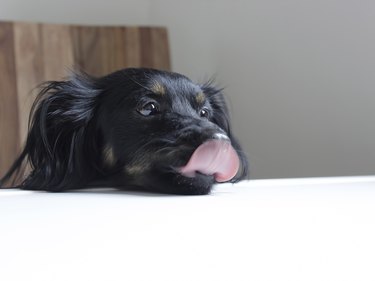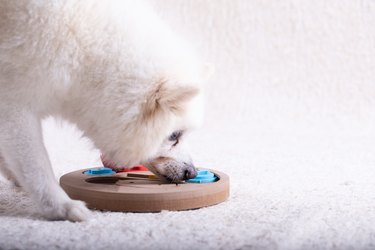Does your dog greet you with a slobbery kiss as soon as you come in the house? While licking people and objects is generally a normal dog behavior, compulsively licking of anything in sight can signal another problem like anxiety, boredom, or a health issue. Dog owners should know that any time a dog exhibits unusual behaviors that it could be due to an underlying pet health issue, so talk with a veterinarian.

Video of the Day
Normal licking behavior in dogs
Dogs lick humans and other animals as a way of investigating their surroundings, greeting, and showing affection. Your dog may lick household surfaces, like kitchen floors or tables where they have successfully found food crumbs in the past. Wash the surfaces your dog seems to lick the most with a pet-safe cleaner to remove residual food particles. Reward your dog when they refrain from licking to reinforce their good behavior.
Video of the Day
Why dogs lick everything
There are many possible causes for a dog's licking behavior, including the following.
Attention-seeking licking behavior in dogs
You may have inadvertently conditioned your dog to lick by giving them attention when they licked you or gave you "kisses." Set up a camera or observe your dog without their awareness of your presence to see if they exhibit the same behavior when you're not around. If they don't lick when alone, you'll need to recondition them. Don't give them attention when they lick you, and when they start licking inappropriate things, give them a chew toy to redirect their attention.
Why is my dog anxious?
A dog who licks excessively might be suffering from anxiety or obsessive-compulsive disorder (OCD). They might lick furniture, bedding, or other unsuitable objects. They might lick themself, even to the point of developing sores. Your veterinarian can help you narrow down underlying causes of the behavior by asking about stressors in your pooch's life. For example, if a new pet has joined the household, the existing one may become anxious and exhibit compulsive behaviors. Separation anxiety should also be ruled out.

Pica in dogs
Pica is the act of eating nonfood items. It can result from a lack of appropriate nutrients or from boredom or anxiety. Some dogs lick compulsively at nonfood items and then eat them. Let your veterinarian know if your dog is attracted to eating things like soil, garbage, rocks, toys, or other household items.
Dogs with nausea
A medical problem could trigger your dog's licking. Excessive licking can be a sign of nausea. A dog with an upset stomach might lick objects to try to make the sensation go away. Nausea can result from several different factors, including:
- Change in diet
- Side effect of medication
- Undiagnosed medical problem, like liver disease, bowel problems, or adrenal gland problems
- Nervous system disorder
- Dental disease or other dental issue
- Intestinal parasites, such as giardia
Provide your veterinarian with a list of foods, medications, and supplements that your dog is taking and explain how long the licking behavior has been going on. Your veterinarian will want to know what methods you have already tried to stop the problem to help determine the underlying cause and recommend appropriate treatment.
Fleas, allergies, and other skin conditions in dogs
If your dog gets fleas, they can be very itchy and uncomfortable. You might notice your pet licking and biting at their skin. You might see live fleas on your dog or "flea dirt" (dark flecks on your dog's skin that brush off with a flea comb). Some dogs are allergic to fleas, which can exacerbate the problem. Avoid fleas by using a monthly flea preventative.
Other possible causes of excessive licking include allergies to certain proteins; medications; or environmental triggers, like grass and pollen. Dogs with allergies tend to lick their paws, and light-colored dogs can develop reddish saliva staining on their feet. Moist dermatitis ("hot spots"), mange, ringworm, and yeast infections can also lead to licking. Consult your veterinarian if you suspect your dog has a skin problem.
Canine pain and licking
Licking can also be a sign of pain. Just as dogs tend to lick external wounds, some will lick the outside of their body even if the pain is internal. Older dogs who develop arthritis might lick at the inflamed limb or joint. If you think this is the case for your dog, make an appointment with your veterinarian to discuss appropriate pain management.

Dog licking from boredom
Beyond anxiety disorders or medical issues, your dog might lick out of boredom when left alone. Change the way you interact with your dog by praising nonlicking behavior and giving them more exercise and attention when you are home to help curb unwanted licking behavior. You might also consider hiring a dog walker or pet sitter to visit your pet daily to mitigate boredom. In addition, treat puzzle toys and lick mats can occupy your pet so they spend a portion of the day working out how to get snacks rather than licking inappropriately.
Affectionate dogs and licking
If your dog loves licking you and your veterinarian has ruled out medical causes, they might just be showing affection. It's a dog's way to instinctively lick to communicate friendship or submission. If you do not like the behavior, do not punish your dog. Ignore the licking and try to get your dog to focus on something else, like exercise, treats, or a toy.
What can you do about a dog's excessive licking?
The first step is to make a veterinarian appointment to explore possible causes of your dog's licking. The solution depends on why your dog is exhibiting the behavior. Once that is determined, your DVM might advise medication to address your dog's anxiety, pain, or other medical condition; behavioral modification techniques; or a change in your dog's diet.
The bottom line
Licking is a normal canine behavior, but when a dog is excessively licking objects, themself, or their owner, it can signal a health condition or behavioral issue. Pet owners can address excessive licking behavior by consulting their veterinarian to figure out why it is happening and to tailor the solution to the cause. Remedies might include medication, redirection or distraction, lifestyle changes, or even something as easy as a monthly flea preventative.